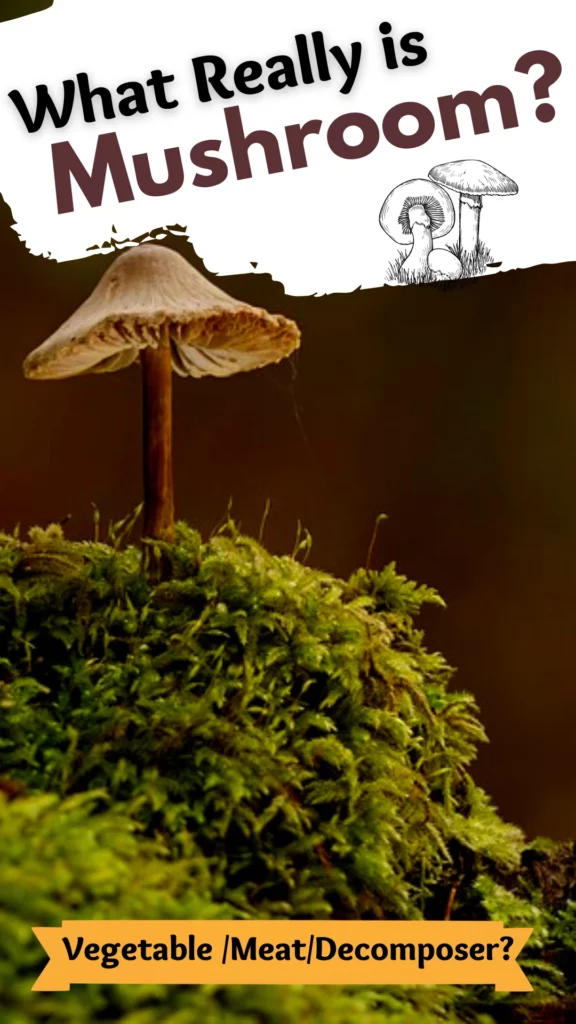Mushroom is not just a tasty edible fungus that treats your taste buds but also, a good decomposer to increase the nutrient value of your garden soil.
And to be short, technically mushrooms are not vegetables and they come under the fungi kingdom. Mushrooms are neither animals (meat) nor Vegetables.
Mushroom don’t produce their own food so they are not termed plants but they are high in protein so it is commonly called as vegetable meat.
Mushrooms can also be called consumers which decompose the decaying organic matter and get the nutrients back to the food chain.
Whether it is for seedling, boosting growth, or neutralizing your planting soil, mushroom compost always benefits our gardening experience delightfully.
Here are some must-know facts about mushroom compost before applying it to your garden-
What Are Mushrooms?
- Mushrooms are edible fungi that grow in a chubby, spore-bearing, and fruiting body over any moist surface
- You can cultivate these toadstools directly on the ground or on the soil
- Sometimes, they grow naturally on a moist log or wooden surface or even any food source as well
- Despite being a delicious edible fungus in the genus, you can use them in your gardening resources as a great organic decomposer.
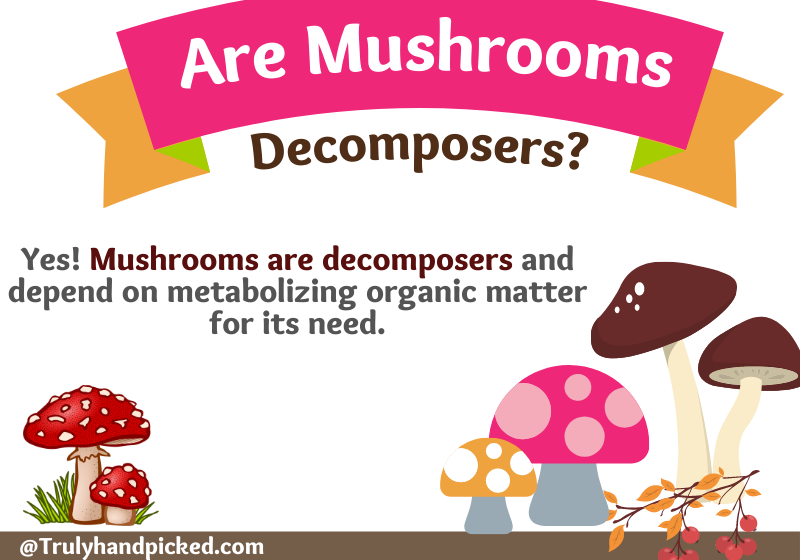
Are Mushrooms Decomposers or Producers?
Mushrooms are decomposers like typical fungi. Fungi with their extended network release enzymes to break the dead, decaying organic matter and later absorb the nutrients from it for their growth.
What do mushrooms eat?
To make it simple, animals and humans eat and digest our food inside, while mushrooms digest their food outside and absorb the nutrients with hyphal walls. Once enough is stored and they are established, the fungi start their fruiting process and later mushroom pops out.
As a result of this decomposing process, they recycle and enrich the soil which enters the food web making it easily available for plants. This way mushrooms act as decomposers and fulfill their essential needs and play their part to keep the ecosystem healthy.
Mushrooms can’t grab their food from living organisms or can’t even make their food like plants. Thus, you can’t call mushrooms producers, as they always get energy by metabolizing dead and decaying materials.
Fungi are the primary decomposers of any forest and fungi are also known as saprotrophs.
Mushroom Compost
What is Mushroom Compost and how it is prepared?
How to: Mushroom spawns are mixed with the best organic materials which are steam and sterile. And it takes more than a month and once the process of growing mushrooms is done the leftover compost we get is called mushroom compost. Some most common used compost materials, which make good ingredients for this compost-
- Hulls
- Corn cobs
- Straws
- Hay
- Horse manure
- Or Chicken manure
- Gypsum
- Peat moss
Simply mushroom compost is a slow-release organic fertilizer from the remains of homemade weed-free organic compost that was used to grow mushrooms. When it is no longer used to fertilize mushrooms, you can apply the remaining compost (or store-bought one) to nourish your garden plants. Sphagnum moss and lime mixed are also mixed with the ingredients to make the best combination for thriving mushrooms.
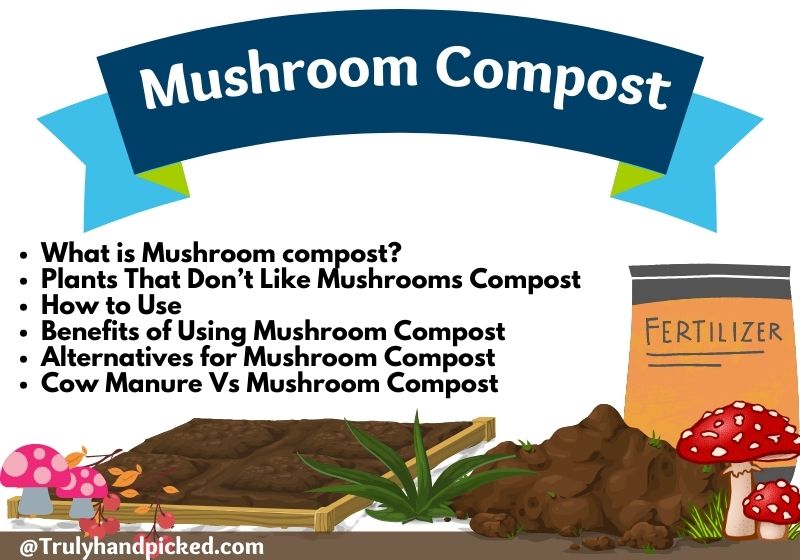
How to Apply Mushroom Compost:
- You can mix mushroom compost directly into your potting soil just like regular compost or use it as topsoil.
- You can even spread a layer of mushroom compost into your garden bed, before seedling for better germination.
- To use them in mulching, apply 2 inches of mushroom compost layer around your plants for better water retention and to prevent weeds.
Mushrooms Compost: Benefits for Soil and Plants
Mushroom compost has plenty of advantages when you use them in your garden soil. Some of the most highlighted benefits of mushroom compost are-
- Enriches the soil with adequate nutrients and acts as an amendment to your planting soil
- Promotes seedling growth and is excellent to boost a plant’s root growth
- Escalates the water-retaining capacity of the soil
- Improves the whole structure of the soil
- Compatible with the utmost garden plants
- You can use them for a good mulching purpose too
- Good for balancing the pH level of planting soil with a lower-pH level and you can neutralize planting soil with this mushroom compost for almost every type of plant, whether it is an herb, crop, fruit, or any flowering plant.
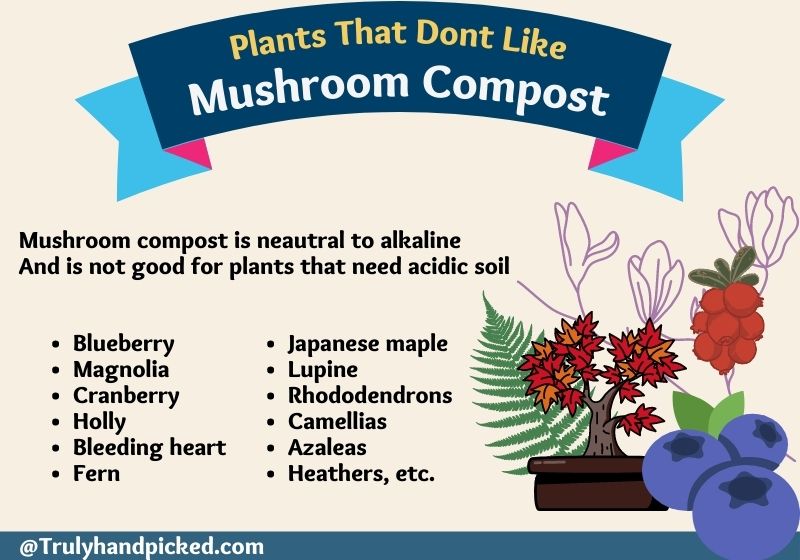
List of Plants That Don’t Like Mushrooms Compost:
Mushroom compost is not good for plants that need acidic soil, as mushroom compost is mostly 6.6+ in pH making it neutral to alkaline.
Despite holding several beneficial qualities, mushroom compost can be harmful when used in a large sum. Sometimes, a few garden plants can’t even stand a mild amount of mushroom compost as well, due alkaline nature.
So, you can say that despite being an all-in-one organic manure, mushroom compost is not good for all plants. There are a few plants, which don’t like mushroom compost like others, they are such-
- Blueberry
- Magnolia
- Cranberry
- Holly
- Bleeding heart
- Fern
- Japanese maple
- Lupine
- Rhododendrons
- Camellias
- Azaleas
- Heathers, etc.
Alternatives for Mushroom Compost
You can use other substitutes to increase the planting quality of your garden soil. Some good substitutes for mushroom compost are-
- Cow manure
- Poultry manure (in moderation)
- Normal potting mix
- Organic mulch
- Worm casting (vermicompost)
- And typical compost or tea(liquid fertilizer) made from kitchen waste
Why Do I Need to Grow Mushrooms in My Garden and Does It Help?
Growing mushroom in your backyard or lawn is a good sign for the health of your garden bed. Planting mushrooms in your yard help your soil to trap moisture for a long while. This way you are allowed to create an organic environment for your other garden plants as well.
So, if you want to know whether it is good for your garden bed to get some fresh mushrooms around, then the answer is yes. Of course, it will help to break down the rich and flaky loam of composts into the soil. This will boost the growth and make the roots healthy of your garden plants naturally.
Mushrooms Compost Vs Cow Manure:
Mushroom compost and cow manure both are excellent things to increase the productivity of your garden beds. However, some expert gardeners claim that mushroom compost is better than cow manure for use for fertilizing a homely garden. As-
- Mushroom compost breaks down easily
- It follows a tedious process comparatively cow manure
- It is more inexpensive and comes with an affordable rate
- Good in alkaline and thus balance soil pH level excellently
- And provides an additional water-holding capacity unlike cow manure
However, some gardeners deny this theory and complain that mushroom compost is high in salt and thus doesn’t go with all types of planting soil. You must decide this depending on the soil type of your garden and the planting variety that you are going to plant in that compost.
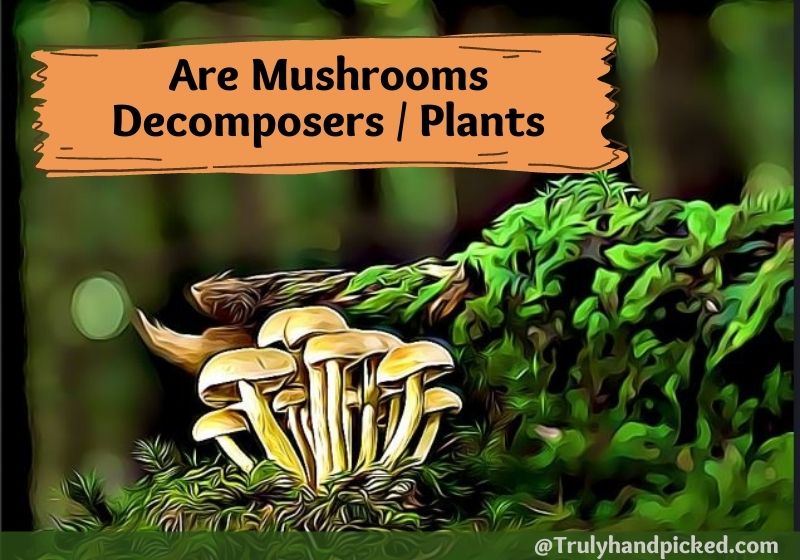
FAQ: Is Mushroom a: Vegetable/Meat/Fungi/Decomposer
Are mushrooms heterotrophs?
Yes, Mushrooms are heterotrophs and not autotrophs as can’t produce their food for their energy needs as plants or algae would. Mushrooms clutch their essential nutrients from decomposing organisms or dead materials.
Do detritivore vs decomposer mean the same?
Detritivores and decomposers are not the same. Detritivores are those organisms that feed on organic waste like dead plants and dead animals. On the other hand, decomposers are the organisms, which decompose dead plants and animals. And yes mushrooms are decomposers and not detritivores like earthworms and termites.
Is a mushroom a plant or an animal?
Mushrooms are neither plants nor animals, they belong to their own kingdom called fungi. They can’t make their foods like plants or consume food like animals, but they drag it from dead organisms for their initial energy requirements.
Do mushrooms have chlorophyll?
Mushrooms don’t have chlorophyll, as this is a typical quality of plant category. Due to this characteristic, plants can continue the process of photosynthesis.
Do fungi make their own food?
As already mentioned fungi don’t have the green pigment called chlorophyll. Without chlorophyll mushrooms or fungi, they cant prepare their food from sunlight, water, and carbon dioxide.
Is a mushroom a fungus?
Not all fungi are mushrooms but all mushrooms are fungi. As mildew, mold, yeast also belongs to fungi and all fungus is not mushroom. Also just like fruits and vegetables are part of a plant, mushrooms are fruiting bodies of fungus to spread spores and make way for next-generation;
Is a mushroom an autotroph?
No! mushrooms are decomposers and they don’t prepare their food like autotrophs. While autotrophs like algae, plants, and cyanobacteria are capable of taking care of self-nourishment through photosynthesis. In simple autotrophs are primary food producers while mushrooms are heterotrophs that depend on other dead and decaying organic matter for their food.
Is a mushroom a vegetable?
Though it is classified and also packed and sold in a vegetable market, technically and structurally mushrooms are not vegetables. They are not vegetables or meat but, they are fruiting bodies of certain fungi just like a plant’s vegetative part, so, to make it easy we have placed mushrooms in the vegetable category.
Mushroom life cycle
Though mushrooms may seem popup in a day, it could be a result of hard work for weeks or months depending upon the fungus. Now let’s see how it all starts from a mature mushroom.
- Inoculation: The mushroom spreads its spores and falls on a favorable medium
- Spores germinate: If conditions are favorite, spores germinate into hyphae (fungal filaments)
- Mycelium underground network: Hyphae grow into a huge underground network called mycelium which feeds on organic matter.
- Hyphal knot: With the name, you could have guessed, condensed storage knots of mycelium network.
- Baby mushroom: Hyphal knots develop into small bumps called primordia.
- Selection of Primordia: Selects the best ones out from the colony of baby mushrooms.
- Tada Mushroom: Once selected the organism focuses and channels its energy to the selected ones to form the beautiful fruiting bodies called mushrooms.
- Repeat again: Spores are generated in the next phase and spread again to start the cycle.
Can Mushrooms Decompose Plastic?
According to the latest reports by scientists, fungi can decompose plastic materials. They can break down plastic easily in just a few weeks to a month time and melt them into organic matter or compost naturally. So, you can call fungi great recyclers too.
